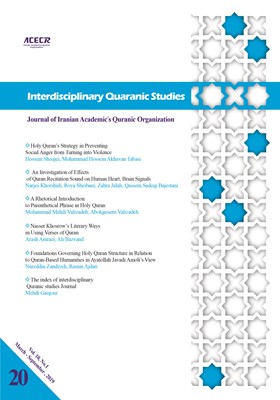Foundations Governing Holy Quran Structure in Relation to Quran-Based Humanities in Ayatollah Javadi Amoli’s View
Subject Areas :Nouroddin Zandieh 1 * , ramin azhdari 2 , seyed mohammad hadi mousavi boioki 3
1 -
2 -
3 -
Keywords: Structure of Holy Quran Islamic Humanities Javadi Amoli ,
Abstract :
Knowledge of the Quran is of great importance in that it is very influential in the field of producing Quran-based human science, because how we look at the Quran determines the extent and type of our expectation from the Holy Book. Knowledge of the Quran can be investigated based on the Quran’s triple doer, internal and ultimate goal systems. The relation between “the Holy Quran” and “human science” based on the Quran’s internal system can be demonstrated as a set of foundations governing the “content” of the Quran and a set of foundations governing the “form”, including the “language” and “style” of the Quran. The content of the Quran fits its ultimate goal and for presenting this content has used a language that can achieve such a goal. Also, the structure and style has been designed in such a way that is capable of realizing such a thing. Hence, the relation between this language and structure vis-à-vis the language and structures of humanities should be determined. In this research, conducted by employing the descriptive-analytical method and based on the views of Ayatollah Javadi Amoli, it will be explained that the Holy Quran not only has acted differently in its style of expression and on the whole refused to take the common methods in human books, but also has fundamental differences with human books in terms of structure and style of arranging and organizing. Issues related to context and how allegories are used… are among the examples of this special structure and style of the Holy Quran.
قرآن کريم
ايزدي، مهدی (1391). سیاق و سباق در مکتب تفسیری علامه طباطبایی، مطالعات قرآن و حدیث، 2(10)، 5-34.
جوادی آملی، عبدالله(1387). الوحي و النّبوّه، قم: اسراء.
جوادی آملی، عبدالله (1390 ب). جامعه در قرآن. قم: اسراء.
جوادی آملی، عبدالله (1390پ). قرآن در قرآن. قم: اسراء.
جوادی آملی، عبدالله (1390 ث). هدایت در قرآن. قم: اسراء.
جوادی آملی، عبدالله (1395). تسنيم. ۴۳ مجلّد، قم: اسراء
جوادی آملی، عبدالله( 1393). نزاهت قرآن از تحریف. قم: اسراء.
جوادی آملی، عبدالله (1384). حيات حقيقي انسان در قرآن (تفسير موضوعي). قم: اسراء.
جوادی آملی، عبدالله (1388). وحی و نبوّت در قرآن. قم: اسراء.
جوادی آملی، عبدالله (1390 الف). ادب فنای مقرّبان. 9 مجلّد، قم: اسراء.
جوادی آملی، عبدالله (1390 ت). وحی و نبوّت، قم: اسراء.
جوادي آملي، عبدالله (1396). شمیم ولایت. قم: اسراء.
رجبي، محمود(1387). روش تفسير قرآن. قم: پژوهشگاه حوزه و دانشگاه.
شفیعی، حسین(1395). دیدگاه تفسیری آیتالله جوادی آملی دربارهی سیاق و نمودشناسی آن. معارج، 1(2)، 21-40.
صدر، محمّد باقر(1395). پژوهشهای قرآني( مترجم: سیّد جلال ميرآقايي). قم: دار الصّدر.
طباطبايي، محمّد حسين(1385). قرآن در اسلام. قم: انتشارات دفتر انتشارات اسلامي.
طباطبايي، محمّد حسين (1395). الميزان في تفسير القرآن. قم: دفتر انتشارات جامعهی مدرّسين حوزهی علميّهی قم.
عیاشی، محمّد بن مسعود(1379). تفسیر عیاشی. قم: بنیاد بعثت.
كنعاني، سيّد حسين(1384). سیر تحوّل کاربرد سیاق در تفسیر. فصلنامهی مشکوه، 87، 28-42.
پايگاه مدرسهی فقاهت، درس تفسير قرآن كريم، مورّخ 28/8/1387 در: eshia.ir/feqh/Archive/Text/Javadi/870828
پايگاه مدرسهی فقاهت ، درس خارج فقه، مورّخ 18/9/1388 در: eshia.ir/Feqh/Archive/Text/Javadi/Feqh/880918

